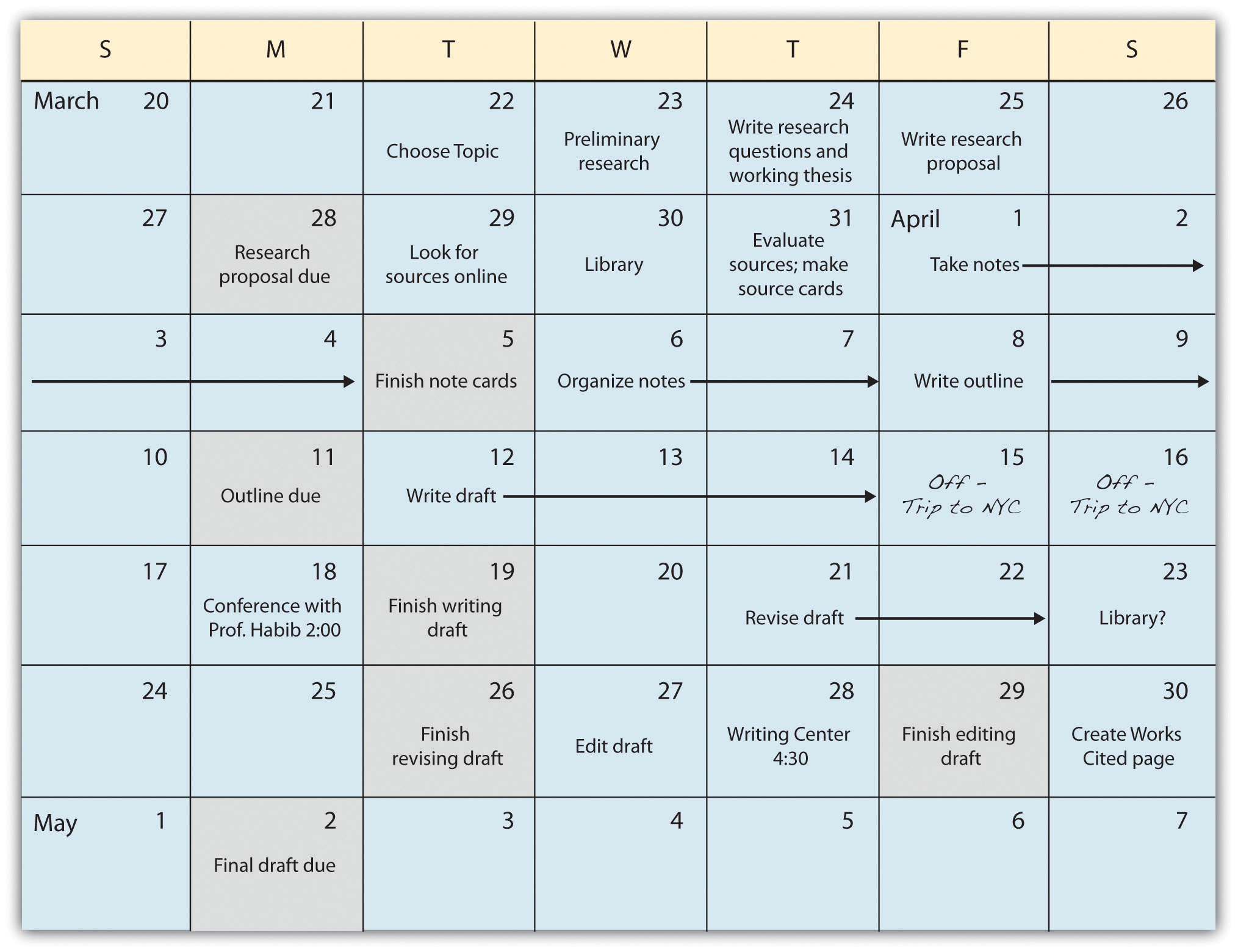Writing from Research
18 Managing Your Research Project
The prewriting you have completed so far has helped you begin to plan the content of your research paper—your topic, research questions, and preliminary thesis. It is equally important to plan out the process of researching and writing the paper. Although some types of writing assignments can be completed relatively quickly, developing a good research paper is a complex process that takes time. Breaking it into manageable steps is crucial. Review the steps outlined at the beginning of this chapter.
Steps to Writing a Research Paper
- Choose a topic.
- Schedule and plan time for research and writing.
- Conduct research.
- Organize research
- Draft your paper.
- Revise and edit your paper.
You have already completed step 1. In this section, you will complete step 2. The remaining steps fall under two broad categories—the research phase of the project (steps 3 and 4) and the writing phase (steps 5 and 6). Both phases present challenges. Understanding the tasks involved and allowing enough time to complete each task will help you complete your research paper on time with a minimal amount of stress.

Planning Your Project
Each step of a research project requires time and attention. Careful planning helps ensure that you will keep your project running smoothly and produce your best work. Set up a project schedule that shows when you will complete each step. Think about how you will complete each step and what project resources you will use. Resources may include anything from library databases and word-processing software to interview subjects and writing tutors.
To develop your schedule, use a calendar and work backward from the date your final draft is due. Generally, it is wise to divide half of the available time on the research phase of the project and half on the writing phase. For example, if you have a month to work, plan for two weeks for each phase. If you have a full semester, plan to begin research early and to start writing by the middle of the term. You might think that no one really works that far ahead, but try it. You will probably be pleased with the quality of your work and with the reduction in your stress level.
As you plan, break down major steps into smaller tasks if necessary. For example, step 3, conducting research, involves locating potential sources, evaluating their usefulness and reliability, reading, and taking notes. Defining these smaller tasks makes the project more manageable by giving you concrete goals to achieve.
This student had six weeks to complete his research project. Working backward from a due date of May 2, he mapped out a schedule for completing his research by early April so that he would have ample time to write. The student chose to write his schedule in his weekly planner to help keep himself on track.
Review the following schedule. Key target dates are shaded. Note that the student planned times to use available resources by visiting the library and writing center and by meeting with his instructor.

Exercise 18.1
- Working backward from the date your final draft is due, create a project schedule. You may choose to write a sequential list of tasks or record tasks on a calendar.
- Check your schedule to be sure that you have broken each step into smaller tasks and assigned a target completion date to each key task.
- Review your target dates to make sure they are realistic. Always allow a little more time than you think you will actually need.
Writing in Process
When you create a project schedule at work, you set target dates for completing certain tasks and identify the resources you plan to use on the project. It is important to build in some flexibility. Materials may not be received on time because of a shipping delay. An employee on your team may be called away to work on a higher-priority project. Essential equipment may malfunction. You should always plan for the unexpected.
Staying Organized
Although setting up a schedule is easy, sticking to one is challenging. Even if you are the rare person who never procrastinates, unforeseen events may interfere with your ability to complete tasks on time. A self-imposed deadline may slip your mind despite your best intentions. Organizational tools—calendars, checklists, note cards, software, and so forth—can help you stay on track.
Throughout your project, organize both your time and your resources systematically. Review your schedule frequently and check your progress. It helps to post your schedule in a place where you will see it every day. Both personal and workplace e-mail systems usually include a calendar feature where you can record tasks, arrange to receive daily reminders, and check off completed tasks. Electronic devices such as smartphones have similar features.
Organize project documents in a binder or electronic folder, and label project documents and folders clearly. Use note cards or an electronic document to record bibliographical information for each source you plan to use in your paper. Tracking this information throughout the research process can save you hours of time when you create your references page.
Exercise 18.2
Revisit the schedule you created in Exercise 18.1. Transfer it into a format that will help you stay on track from day to day. You may wish to input it into your smartphone, write it in a weekly planner, post it by your desk, or have your e-mail account send you daily reminders. Consider setting up a buddy system with a classmate that will help you both stay on track.
Anticipating Challenges
Do any of these scenarios sound familiar? You have identified a book that would be a great resource for your project, but it is currently checked out of the library. You planned to interview a subject matter expert on your topic, but she calls to reschedule your meeting. You have begun writing your draft, but now you realize that you will need to modify your thesis and conduct additional research. Or you have finally completed your draft when your computer crashes, and days of hard work disappear in an instant.
These troubling situations are all too common. No matter how carefully you plan your schedule, you may encounter a glitch or setback. Managing your project effectively means anticipating potential problems, taking steps to minimize them where possible, and allowing time in your schedule to handle any setbacks.
Many times a situation becomes a problem due only to lack of planning. For example, if a book is checked out of your local library, it might be available through interlibrary loan, which usually takes a few days for the library staff to process. Alternatively, you might locate another, equally useful source. If you have allowed enough time for research, a brief delay will not become a major setback.
You can manage other potential problems by staying organized and maintaining a take-charge attitude. Take a minute each day to save a backup copy of your work on a portable hard drive. Maintain detailed note cards and source cards as you conduct research—doing so will make citing sources in your draft infinitely easier. If you run into difficulties with your research or your writing, ask your instructor for help, or make an appointment with a writing tutor.
Exercise 18.3
Identify five potential problems you might encounter in the process of researching and writing your paper. Write them on a separate sheet of paper. For each problem, write at least one strategy for solving the problem or minimizing its effect on your project.
Writing in Process
Image Descriptions
Figure 18.2 Image Description: A list of dates between March 22 and May 2 with a plan for what tasks for a research paper should be completed on what days. An * marks key target dates.
March
- Tuesday: Choose topic.
- Wednesday: Preliminary research.
- Thursday: Write research questions and working thesis.
- Friday: Write research proposal.
- Saturday: Nothing.
- Sunday: Nothing.
- *Monday: Research proposal due.
- Tuesday: Look for sources online.
- Wednesday: Library.
- Thursday: Evaluate sources; make source cards.
April
- Friday: Take notes.
- Saturday: Take notes.
- Sunday: Take notes.
- Monday: Take notes.
- *Tuesday: Finish note cards.
- Wednesday: Organize notes.
- Thursday: Organize notes.
- Friday: Write outline.
- Saturday: Write outline.
- Sunday: Nothing.
- *Monday: Outline due.
- Tuesday: Write draft.
- Wednesday: Write draft.
- Thursday: Write draft.
- Friday: Off. Trip to NYC.
- Saturday: Off. Trip to NYC.
- Sunday: Nothing.
- Monday: Conference with Professor Habib at 2pm.
- *Tuesday: Finish writing draft.
- Wednesday: Nothing.
- Thursday: Revise draft.
- Friday: Revise draft.
- Saturday: Library?
- Sunday: Nothing.
- Monday: Nothing.
- *Tuesday: Finish revising draft.
- Wednesday: Edit draft.
- Thursday: Writing Centre at 4:30.
- *Friday: Finish editing draft.
- Saturday: Create Works Cited page.
May
- Sunday: Nothing.
- *Monday: Final draft due.
Text Attributions
- This chapter was adapted from “Managing Your Research Project” in Writing for Success by a publisher who has requested that they and the original author not receive attribution (and republished by University of Minnesota Libraries Publishing). Adapted by Allison Kilgannon. CC BY-NC-SA.
Media Attributions
- Figure 18.1 “Visual Summary” © Polina Joffe is licensed under CC BY-NC-ND 4.0.

